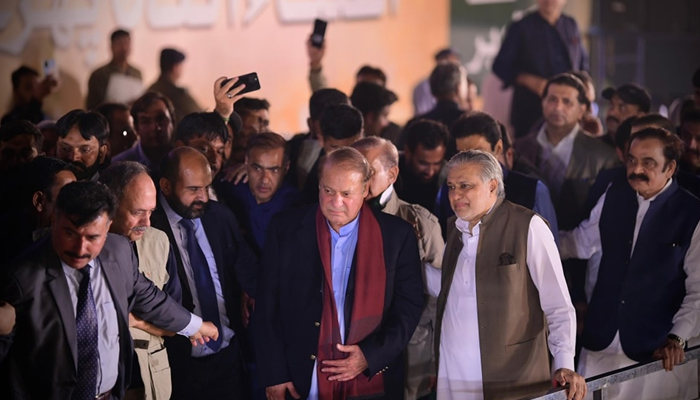PMLN-led allies expected to win, PTI may lose polls: EIU
ISLAMABAD: An election will be held in early 2024, at which the Economist Intelligence Unit (EIU) expects a victory for the coalition, led by the Pakistan Muslim League Nawaz (PMLN), under former prime minister Shehbaz Sharif, “with help from the military, despite widespread discontent with the government’s austerity measures”.
The EIU says in its assessment the opposition Pakistan Tehreek-e-Insaf (PTI) party will lose. “Domestic protests will intensify, but will be curbed swiftly by the military,” added the report.
Political stability and security are tenuous in Pakistan, and real GDP will contract mildly in fiscal year 2023/24 (July-June), according to the report. Pakistan secured a nine-month loan package from the IMF in June 2023, which will help the country to stave off a default on sovereign debt obligations over 2023-24, amid persistent balance-of-payment and fiscal strains. “China will remain a major strategic and financial ally of Pakistan, while relations with India will continue to be strained.”
Another report, presented by Ipsos’ Consumer Confidence Survey, conducted in early 2023, said Pakistan would enter the new year with growing confidence despite a disruptive start to the year. The country grappled with severe flooding, soaring inflation, political instability, and a delay in the IMF’s standby agreement.
The survey findings revealed a staggering 94 per cent of respondents believed the country was heading in the wrong direction. This marked the highest level of negative sentiment since Ipsos began surveying consumer confidence in Pakistan in 2019, underscoring the gravity of the situation.
In the face of adversity, international donors rallied to support Pakistan’s recovery efforts. Over $9 billion was pledged to help the nation rebound from the devastating floods. This financial aid provided a lifeline to a country battered by the natural disaster.
The month of May brought its own set of challenges as widespread demonstrations targeted military installations, exacerbating political instability. However, Pakistan’s state institutions demonstrated remarkable resilience and swiftly overcame the turmoil, preventing further escalation and fostering stability.
Post-May, there was a glimmer of hope on the economic horizon. In July, the long-awaited IMF standby agreement was finally signed, offering a ray of hope to Pakistan’s beleaguered economy. This agreement heralded a potential turnaround, offering a lifeline to an economy in need.
The Government of Pakistan further bolstered optimism by establishing the Special Investment Facilitation Council (SIFC) in an effort to encourage foreign investment in July. This initiative signaled an avenue for growth and development in key sectors such as IT, energy, mining, agriculture, and defence exports. These developments significantly increased consumer confidence, with 16pc of consumers expressing positive sentiment (Ipsos, July 2023). This figure marked a notable improvement, being 2.5 times higher than the sentiment recorded in January.
The momentum continued with crackdowns by the government on illicit activities like tax evasion, leading to tangible improvements, including a remarkable 10pc currency appreciation within September and early October. Additionally, in October, the stock market (the KSE 100-index) reached its highest point in the last six years, underscoring the growing confidence in Pakistan’s economic prospects.
With the elections announced for early 2024, Pakistan stands on the cusp of a new chapter, armed with valuable lessons learned from a year of trials and triumphs.
-
 Kate Middleton, Prince William Break Silence Over Tragic Shooting In Canada
Kate Middleton, Prince William Break Silence Over Tragic Shooting In Canada -
 'Finding Her Edge' Star Madelyn Keys Explains Adriana's Remarks About Brayden Romance
'Finding Her Edge' Star Madelyn Keys Explains Adriana's Remarks About Brayden Romance -
 Royal Expert Raises Questions Over Sarah Ferguson's 'plotting' Stunning Comeback
Royal Expert Raises Questions Over Sarah Ferguson's 'plotting' Stunning Comeback -
 Instagram Develops AI ‘Create My Likeness’ Tool To Generate Personalised Photos And Videos
Instagram Develops AI ‘Create My Likeness’ Tool To Generate Personalised Photos And Videos -
 Meghan Markle, Prince Harry Friends Suggest Their Marriage 'isn't All It Seems'
Meghan Markle, Prince Harry Friends Suggest Their Marriage 'isn't All It Seems' -
 Andrew Handed Out 'classified' Information To Jeffrey Epstein
Andrew Handed Out 'classified' Information To Jeffrey Epstein -
 Margot Robbie Recalls Wild Party Days And Getting Kicked Out Of Clubs
Margot Robbie Recalls Wild Party Days And Getting Kicked Out Of Clubs -
 NASA's Hubble Space Telescope Discovers ‘Dracula Disk', 40 Times Bigger Than Solar System
NASA's Hubble Space Telescope Discovers ‘Dracula Disk', 40 Times Bigger Than Solar System -
 Annular Solar Eclipse 2026: Where And How To Watch ‘ring Of Fire’
Annular Solar Eclipse 2026: Where And How To Watch ‘ring Of Fire’ -
 Zayn Malik Explains Past Comments About Not Being In Love With Gigi Hadid
Zayn Malik Explains Past Comments About Not Being In Love With Gigi Hadid -
 Internet Reacts To 10 Days Flight Ban Over El Paso
Internet Reacts To 10 Days Flight Ban Over El Paso -
 YouTube Music Tests AI-powered ‘Your Week’ Recap To Summarise Listening Habits
YouTube Music Tests AI-powered ‘Your Week’ Recap To Summarise Listening Habits -
 Kelly Clarkson Ready To Date After Talk Show Exit?
Kelly Clarkson Ready To Date After Talk Show Exit? -
 Is AI Heading Into Dangerous Territory? Experts Warn Of Alarming New Trends
Is AI Heading Into Dangerous Territory? Experts Warn Of Alarming New Trends -
 Google Updates Search Tools To Simplify Removal Of Non-consensual Explicit Images
Google Updates Search Tools To Simplify Removal Of Non-consensual Explicit Images -
 Chilling Details Emerge On Jeffrey Epstein’s Parties: Satanic Rights Were Held & People Died In Rough Intimacy
Chilling Details Emerge On Jeffrey Epstein’s Parties: Satanic Rights Were Held & People Died In Rough Intimacy




